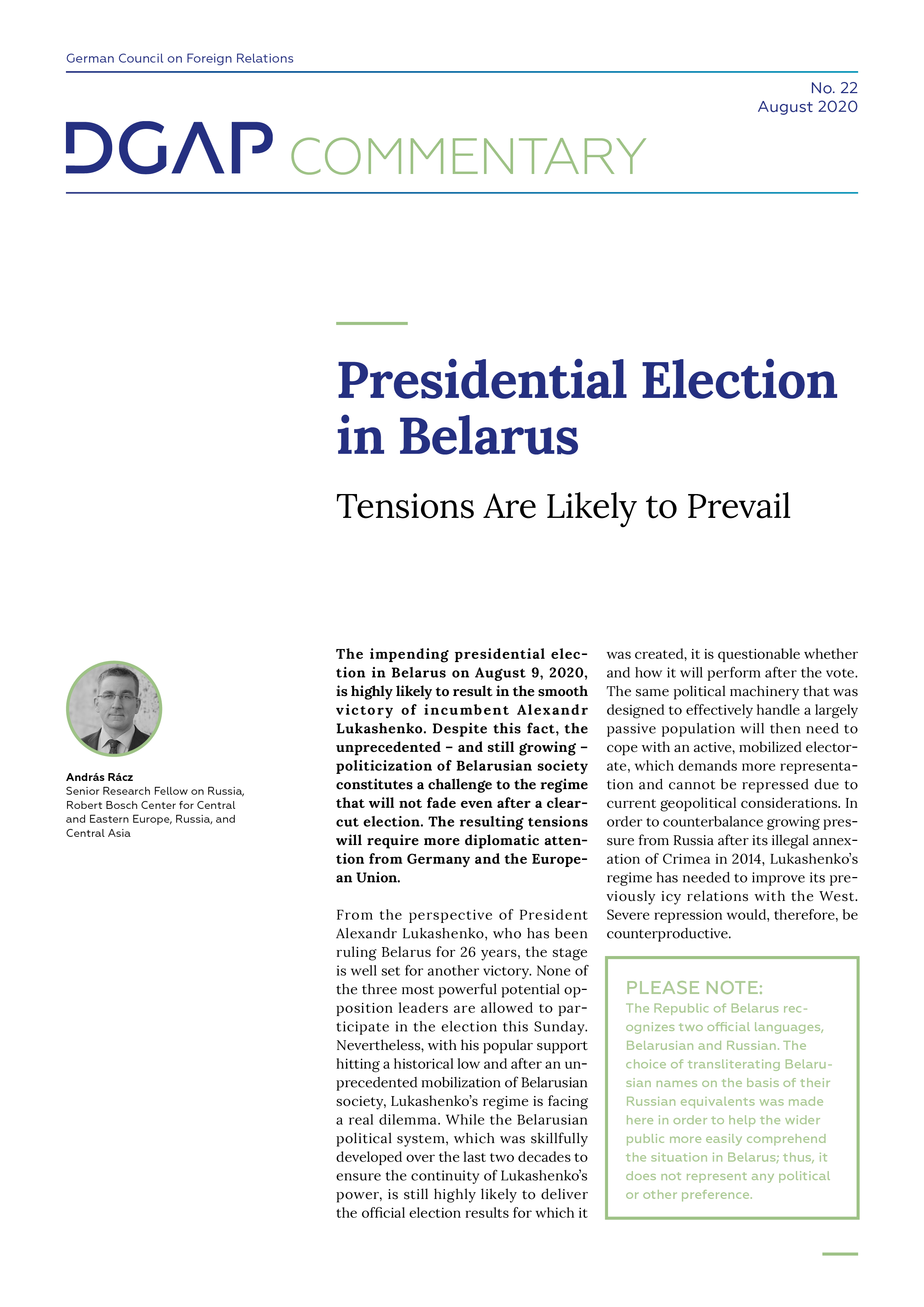Please note: The Republic of Belarus recognizes two official languages, Belarusian and Russian. The choice of transliterating Belarusian names on the basis of their Russian equivalents was made here in order to help the wider public more easily comprehend the situation in Belarus; thus, it does not represent any political or other preference.
From the perspective of President Alexandr Lukashenko, who has been ruling Belarus for 26 years, the stage is well set for another victory. None of the three most powerful potential opposition leaders are allowed to participate in the election this Sunday. Nevertheless, with his popular support hitting a historical low and after an unprecedented mobilization of Belarusian society, Lukashenko’s regime is facing a real dilemma. While the Belarusian political system, which was skillfully developed over the last two decades to ensure the continuity of Lukashenko’s power, is still highly likely to deliver the official election results for which it was created, it is questionable whether and how it will perform after the vote. The same political machinery that was designed to effectively handle a largely passive population will then need to cope with an active, mobilized electorate, which demands more representation and cannot be repressed due to current geopolitical considerations. In order to counterbalance growing pressure from Russia after its illegal annexation of Crimea in 2014, Lukashenko’s regime has needed to improve its previously icy relations with the West. Severe repression would, therefore, be counterproductive.
Only a few weeks after EU-Belarus visa facilitation came into force on July 1, 2020, the impending presidential election now poses a significant challenge to the cautious normalization that has been developing between the European Union and Belarus. Especially given Germany’s presidency of the EU Council, German diplomacy, which has already played an important role in this process, will be needed more than ever in the aftermath of this election – particularly if any major crisis occurs.
“Three Ladies” Replace the Established Political Opposition
The biggest challenge to Lukashenko’s system is not the traditional political opposition but rather the increased political activism of Belarusian society that is fueled by economic hardship as well as the regime’s denials of the COVID-19 pandemic. Even when Lukashenko’s regime made it impossible for the three most powerful potential opposition candidates – blogger Sergei Tikhanovksy, former regime insider Viktor Babariko, and former Belarusian ambassador to Washington Valery Tsepkalo – to run in the election, it could not prevent bottom-up mobilization.
Tikhanovksy could not register as a candidate because he has been in administrative arrest since May 6, 2020. Babariko, who previously headed the Belgazprombank, was arrested on fraud-related charges on June 18 and banned from registering. Tsepkalo, who also founded Belarus’s Hi-Tech Park, was prevented from running. In his case, the Central Elections Commission (CEC) invalidated so many of the 160,000 signatures that he submitted to recommend his candidacy that he could not pass the nomination threshold of 100,000. Although three other opposition candidates (Andrei Dmitriev, Anna Konopatskaya, and Sergei Cherechen) did make it onto the ballots, their popularity and potential to mobilize voters are miniscule compared either to Lukashenko or any of these three banned opposition figures.
Still, there is a fourth opposition candidate indeed worth noting: Svetlana Tikhanovskaya, the wife of banned candidate Sergei Tikhanovksy, who made a brave, sudden move to become an official presidential candidate in his stead. Unprecedented crowds of tens of thousands of people have attended Tikhanovskaya’s rallies, in which she appears together with Veronika Tsepkalo, the wife of banned candidate Valery Tsepkalo, and Maria Kolesnikova, the former campaign manager of Babariko. By joining forces, these “three ladies” have two key advantages. First, they are not members of the old Belarusian democratic opposition, which has been defeated in every previous election. Second, they can be bolstered by the backers of Babariko and Tsepkalo, genuine, bottom-up politicians who have already proven themselves in business and politics and enjoy the grassroots support of wide segments of Belarusian society. From this perspective, one can see similarities to the recent elections of Slovakian President Zuzana Čaputová or Ukrainian President Volodymyr Zelenskyi, both of whom were political newcomers who successfully challenged both the incumbents and opposition.
So far, the regime has employed both information deterrence and demonstrative use of force in order to prevent further political mobilization. Supporters of the opposition have been abducted from busy streets by officers in plain clothes, and hundreds are getting arrested on administrative charges. While state television aired news about a brutal riot police unit that is fanatically loyal to Lukashenko, the president himself has sworn publicly that he will prevent any Maidan-type scenario from taking place in Belarus. As yet, violence has remained individually targeted, and no mass crackdown have taken place.
In addition, the regime has ensured that election observation will be limited. Because the Belarusian Foreign Ministry sent its invitation to the Organization for Security and Cooperation in Europe so late that long-term international observation was made impossible, the OSCE is not sending observers. Moreover, Belarus’s CEC limited domestic observation by claiming the need to maintain social distancing due to the COVID-19 pandemic. The regime has also established many other administrative measures to ensure the expected result.
Because it is forbidden to publish election-related opinion polls in Belarus, no data-based comparison between the candidates is possible. Still, several unofficial surveys, as well as the published numbers of signatures collected to nominate candidates, indicate that the president’s popularity is relatively low, particularly in Minsk. Meanwhile, mass attendance at the gatherings of the three ladies demonstrate that they are indeed popular and have substantial potential to mobilize voters. Since people have taken to the streets for a last-minute presidential candidate joined by two other women who are not even on the ballot, it is unlikely that this protest mood will disappear after the election. Therefore, the atmosphere poses a serious challenge to Lukashenko’s system.
Post-Election Period Is of Crucial Importance
The Belarusian opposition has traditionally organized large-scale demonstrations in Minsk on the eve of presidential elections. The protests in 2006 and 2010 were smashed; even prominent opposition politicians were beaten and arrested. In the post-Crimea geopolitical context, however, Belarusian authorities have been a lot less repressive. The fact that the 2015 presidential election was managed smoothly, without any major crackdowns, paved the way for the EU to lift most of its sanctions on Belarus in 2016.
Consequently, how the regime will handle the opposition in the few days left until the August 9 election – and particularly thereafter – is crucially important. Geopolitical considerations could still point to a relatively light-handed treatment of election-related protests. The current opposition, however, has been much different from anything that Lukashenko has yet to face. Moreover, due to his low popularity, the official results are going to be less in line with the population’s real preferences than ever before. Hence, genuinely angry opposition protests cannot be ruled out. An external actor – most likely, Russia – could use the opportunity to fuel these protests through meddling, causing the regime to overreact. If a major crackdown, similar to the one in 2010, can be provoked, it would endanger Lukashenko’s normalization efforts with the West, thus serving Russia’s interests.
Little Green Men Again?
The possibility of Russian meddling made the July 29 detention of 33 Russian citizens by Belarusian authorities breaking news. According to Belarusian officials, the Russians, who were accused of being members of the Wagner Group, a Russian private military company, were in touch with the Tikhanovsky team and belonged to a larger group of approximately 200 operatives whose task was to stage provocations during the election. The news story had a prologue. On July 24, during a visit to a special forces base, Lukashenko announced that private military contractors could arrive from abroad and the Belarusian military would need to be ready to “prevent an escalation.”
Whatever the real reason for the presence of those Russians in Belarus was – a plausible explanation is that they were en route to a mission in a third country – Lukashenko apparently decided to instrumentalize the incident in both domestic and foreign policy. By blaming Tikhanovsky, he delivered a blow to the opposition. By accusing Russia, he created a narrative that he could later use both at home and in Moscow. Despite the stalled Union State project – an old, Russian-led quasi-supranational integration project between the two countries – Moscow has consistently tried to curtail the economic, financial, military, and political sovereignty of Belarus.
Normalization of EU-Belarus Relations Must Continue
Unless serious repressions occur during or after the election, the EU needs to continue its cautious normalization process with Belarus, thus helping Minsk to counterbalance pressure from Moscow. The lifting of EU sanctions in 2016 was a landmark result of this process, as is the agreement on visa facilitation and readmission between the EU and Belarus that came into force on July 1, 2020. Though there is no valid Partnership and Cooperation Agreement between the EU and Belarus, which is a prerequisite for any deeper institutionalization of bilateral ties, there are still other options to pursue. It is important, for example, to further strengthen economic, business, and investment ties between Belarus and the West, thus decreasing Minsk’s dependence on Moscow. Because membership in the World Trade Organization could make Belarus a significantly more attractive partner for Western investors – including German ones – it is in the best interest of the EU and Germany to foster Belarus’s accession to the WTO.
If a major crackdown takes place or people are imprisoned on political charges, the EU needs an answer that acts as a strong deterrent, preventing a further deterioration of the situation while not negating the results of the normalization process. After an initial response from High Representative Josep Borrell, the European Council could follow up on the statement made on June 1, 2020, by Robert Biedroń, chair of the European Parliament’s Delegation for Relations with Belarus, and Petras Auštrevičius, the European Parliament’s standing rapporteur on Belarus. In it, they demanded the review of the EU’s policy toward Minsk and suggested new sanctions targeting the officials responsible for more repressions, should they occur. In order not to alienate the Belarusian population, these sanctions should precisely target the personal and economic assets of regime leaders.
While cooperating with an authoritarian regime is indeed controversial and may make it harder for the EU to conduct a credible dialogue on human rights with external partners, supporting the Belarusian president in order to preserve the country’s sovereignty vis-à-vis Russia is crucially important for the EU’s own security interests.

